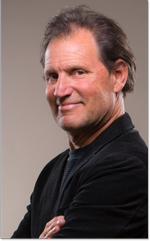
Bill English, Artistic Director
These mornings it seems grief rolls in like the fog, and I find myself in meditation on the floor in a pile of tears. Something seems to have been irrevocably lost. The vision I always held of a people united by dreams, hopes, and yearnings has been ripped asunder. We cannot speak to our other half without bitter hatreds blooming everywhere like barbed wire sage brush rolling across the plains. Aaron Loeb, in his essay, “The National Divorce,” describes what seems like two groups of Americans with utterly irreconcilable differences, fighting ruthlessly over “the kid,” and though there have been years of fighting and competition for power, what many of us remember as a spirit of unity about our national destiny seems to have dissolved. Aaron helped me understand my grief. It’s not about my own political persuasion, but more about the sense of hopelessness that seems to have descended on our nation and out of which few of us can see a path forward.
As an artist, I must always look for hope. Hope that springs out of a heroic act that sets an example for us…
As an artist, I must always look for hope. Hope that springs out of a heroic act that sets an example for us, an act like Antigone’s or John Proctor’s in The Crucible. Some principles are more important than life. Hope that blooms from something so simple as Ebenezer Scrooge’s personal transformation in A Christmas Carol. If this miser can change, so can anyone. It comes from The Miracle Worker, where a young girl overcomes insurmountable odds. We find hope in the story of Born Yesterday, when an ignorant young woman with no sense of herself grows a powerful social conscience.
I think of two stories from my youth where I learned about hope in the face of political cataclysm. On Nov. 22, 1963, in my junior high drama class, the intercom suddenly crackled on and a scratchy radio voice told us that President John F Kennedy was dead. It was a horrible way to tell 13-year olds, or anyone for that matter, what had happened. We were devastated and most everyone was in tears. Since it was near the end of class, the bell rang, and the crackly voice told us to go to our next class, which in my case was chorus, led by my favorite teacher ever, Kenny Wells. We filed in drearily, many of us crying openly and sat despondently in our places. Mr. Wells was nowhere to be seen. For what seemed like too long. And then suddenly he burst from his office and making no effort to wipe the tears from his face, he virtually yelled at us, “I know you are all shocked and sad, but what we are going to do, is sing. And he pulled out the music to “Randall Thompson’s “Alleluiah” and sing we did, our voices lifting us up out of grief. By the time our crackly big brother told us all to go home, we were better. A small wedge of hope had been forcibly injected into our hearts and at least we could walk. I’ve never forgotten that day.
Some years later, I was matriculating at Northwestern University when the Kent State shootings occurred. Like most universities, Northwestern shut down. Everyone could accept a passing grade for classes and go home. But faculty and students were allowed to stay if they did work that spoke to that version of the great American divide. In the drama school, we produced an anti-war play, the Living Theatre’s The Brig, and I played (and tried to develop empathy for) a cruel Marine Corps drill sergeant.
But there was also a lot of unrest. There were huge protests and rallies and I was briefly arrested with others for lowering the flag to half-mast in the Evanston town square. At one of the more raucous rallies, a contingent of SDS or some quasi-violent wing of the protest movement said they were going to go burn down the ROTC building. This had happened at a few campuses across the nation. But even if they actually would have followed through, this group of lunatics were foiled when they arrived at the building to find it surrounded and guarded by members of the Black Panther Party who would not allow the force of their revolution to be cheapened by stupid violence. And I was so deeply moved. And inspired. As I had been by our tearful choral director.
These two stories have been stalking my brain in the past weeks. They don’t have much in common, but recovering them inspired me up off the floor and into the empathy gym where I belong, with the great artists, technicians, administrators, and patrons who keep us on track as we search for messages that unify us, stories that remind us of what we can be, tales that lift us up, or tune us in, or help us find the path.

Bill
Latest posts by Bill English (see all)
- The 39 Steps: A Note from the Artistic Director - March 2024
- My Home on the Moon – A note from the Artistic Director - January 2024
- Guys and Dolls: A Note from the Artistic Director - November 2023




Bill – As I read your story I began to feel in my solar plexus that warning sign of “here comes compassion, here comes empathy, here probably comes the tears.” And as I read on you brought back memories that I too can never forget. That crackling PA system announcement, tears and unknowing, my chorus teacher had not recovered enough to sing and likely because we were one of two rooms that had a black and white TV to watch Walter Cronkite make the announcement that the President was dead. We marched out of chorus silently, wondering what our world would be like, the next day, the next minute, the next breath. And without saying anything about it, you know I am of the age to have known Kent State, peace rallies, and the lottery that drafted so many to “the war.”
But there is hope – for just today I was at lunch with my 94-year-old friend Bill. We were talking about having recently seen The Christians. Bill suddenly launched into a story about how he was standing at the half price ticket window in Union Square when a man filled with energy and enthusiasm came up to him and asked if he wanted to buy tickets to a fabulous production from a new theater group. Bill bought the tickets from the energetic man, one Bill English, and saw his first performance at the SF Playhouse over ten years ago.
Look at the SF Playhouse today. In a great theater, still fabulous productions, the Rising Star program and a well-known and active part of the San Francisco community. The hope of that energetic man selling tickets has been realized. Yes, Bill, get up off the floor and get yourself to the Empathy Gym where you belong, and Bill, never, ever give up hope.
Oh and Thank you for the SF Playhouse – It helps us all hold on to our “hope.”
Yes! Wonderful! We need to keep the stories alive.
Bill: Thank you for sharing your thoughts, We are indeed in a turbulent time in the state of our nation. We live in one of the greatest nations of the world which allow any of us to voice our personal opinions and to oppose the rule of the land. Many people do not like our current shape of Federal Government, but this is the peoples will. For the first time in the history of this land we have a President who does not come from the political arena and this may be a good thing, because it has many of the “Good Old Boys Club” worried. This story, like many of the plays you present in the Empathy Gym will get played out and we can only hope that the ending will make us a stronger nation.
Keep up the great work of presenting some of the best theatre in the Bay Area.
The flame for hope is still here. I just moved my large framed poster of Obama and Hope onto my kitchen wall where all who come to my Mardi Gras party will see it.
Thank you, Bill, for a very thoughtful and positive view on what is a huge tragedy in our country right now. I reposted on my Facebook page.
Good stuff, Bill, thanks. In these times, especially living in the relatively insular political climate of San Francisco, I keep having to remind myself to try to humanize “the other side” rather than demonizing them. I think plays like The Christians or The Nether are important because they force me to see people with whom I don’t agree as real humans with real struggles. Thank goodness for the arts.